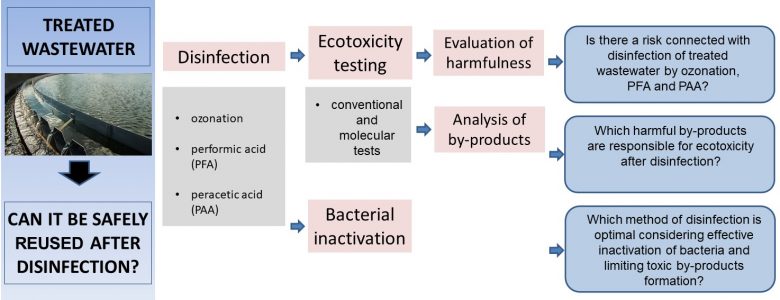Endocrine disruption, harmful by-products and pathogen inactivation during disinfection of treated wastewater
Project title: Endocrine disruption, harmful by-products and pathogen inactivation during disinfection of treated wastewater
Project Manager: dr Katarzyna Affek
Implementing institution: main Faculty of Building Services, Hydro and Environmental Engineering WUT, cooperation with Faculty of Chemistry (contractor Katarzyna Lech, PhD)
Source of funding: Excellence Initiative: Research University (IDUB) programme
The project addresses the issue of harmful by-products formation during disinfection of effluents from wastewater treatment plants (WWTPs). The principal driving forces for research in this area are recognition of treated wastewater as an alternative source of water for agriculture and protection of natural water bodies against sanitary pollution. Treated wastewater contains a variety of pathogens that are vectors of drug-resistance genes, which are capable of survival in the environment long enough to be transmitted to humans. Disinfection of effluents from WWTPs can significantly reduce the abundance of pathogens and thus decrease the risk of disease and drug-resistance transmission. However, many chemicals present in treated wastewater contribute to the formation of harmful by-products during the disinfection process (DBPs).
The aim of this project is to investigate the consequences of disinfection of effluents from full-scale WWTP, including the formation of harmful DBPs, which may cause effects of ecotoxicity, genotoxicity and hormonal disorders in organisms. The efficiency of pathogens’ inactivation will be examined simultaneously.
It is planned to examine three disinfection methods: ozonation, peracetic and performic acid application. Reduction of harmful by-products formation during wastewater disinfection and inactivation of bacteria will be analysed by conventional and molecular techniques. The scope of the research will include: selection of disinfection parameters based on literature data and preliminary research, disinfection of effluent from full-scale WWTP by three methods at various operational parameters, analysis of bacterial inactivation using conventional and molecular methods, determination of acute and chronic ecotoxicity of effluents using conventional tests and microbiotests with bacteria, algae and crustaceans, determination of genotoxicity of effluents using molecular tests with bacteria, determination of endocrine disruption effect of effluents using molecular tests with yeast (before and after disinfection). Additionally, the identification of harmful DBPs will be conducted.

The research will provide invaluable comparison of disinfection techniques considering parameters limiting the formation of harmful disinfection by-products while ensuring efficient inactivation of pathogens in effluents. Implementation of this innovative and socially useful project will contribute to development of knowledge in the field of environmental engineering and ecotoxicology. It will result in describing the most effective method for disinfection of effluents, considering the lowest recorded ecotoxicity and genotoxicity, as well as the highest efficiency of pathogens’ inactivation. The obtained results will be helpful to environmental risk assessors and risk managers to make accurate decisions. The project will also provide valuable data for safe management of treated wastewater, considering particularly public health.
Planned results of the project: One publication in the highest scored journals (140-200 points), 1-2 publications in journals for approx. 100 points. and obtaining external financing for the continuation of research.
